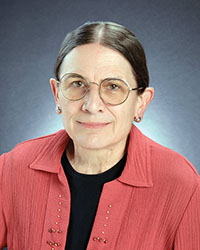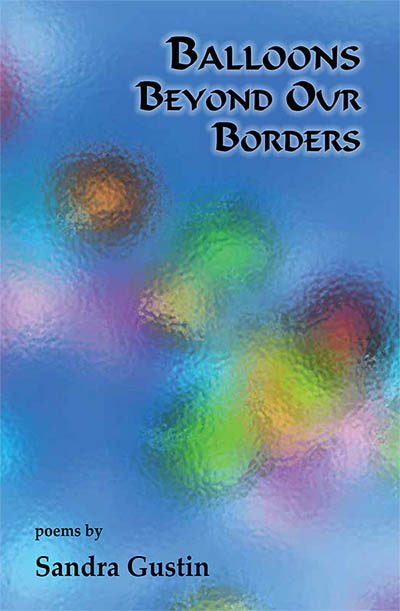Balloons Beyond Our Borders
poems by
Sandra Gustin
~68 pages, $14 (+ shipping)
Projected Release Date: April/May 2025
An Advance Sale Discount price of $8.50 (+ shipping) is available HERE prior to press time. This price is not available anywhere else or by check. The check price is $13/book (which includes shipping & sales tax) and should be sent to: Main Street Rag, 12180 Skyview Drive, Edinboro, PA 16412.
PLEASE NOTE: Ordering in advance of the release date entitles the buyer to a discount. It does not mean the book will ship before the date posted above and the price only applies to copies ordered through the Main Street Rag Online Bookstore.
 Sandra Gustin, M.D., grew up in an Air Force family and is herself a Navy veteran. After her time in the Navy Medical Corps, she lived and worked cross-culturally on three different continents for a total of three and a half decades before returning to Texas to retire. She received an MFA from the University of Texas at El Paso when she was 64. Her work has appeared in Poetry, Bellevue Literary Review, AAP’s Poem-a-Day Series, Five Points, The Anglican Theological Review and others.
Sandra Gustin, M.D., grew up in an Air Force family and is herself a Navy veteran. After her time in the Navy Medical Corps, she lived and worked cross-culturally on three different continents for a total of three and a half decades before returning to Texas to retire. She received an MFA from the University of Texas at El Paso when she was 64. Her work has appeared in Poetry, Bellevue Literary Review, AAP’s Poem-a-Day Series, Five Points, The Anglican Theological Review and others.
Balloons Beyond Our Borders is a book of remembering. Informed by Sandra Gustin’s upbringing in a military family, her navy service, and her civil work abroad, the poems remember borders of the cold war, revisit those of the ancient silk trail, and the beginnings of wars whose patterns and boundaries continue today. And always they seek to cross, with language, through flight paths of birds, through prayer and compassionate imagination. ~Marcela Sulak’s most recent collection is The Fault
Sandra Gustin’s striking and resonant debut collection marks the arrival of a poet who, throughout this collection, reflects upon a life repeatedly on the move. Balloons Beyond Our Borders grapples with the complexity of language, conflict, family, home, and memory. These poems guide us toward a spirituality that can only emerge from a life of seeking, of attempting to “witness creation´s blue/ audacity in the face of threat.” ~Matthew Siegel
Sandra Gustin’s poems are at once historical, generational and deeply personal. She keeps one eye on the movements and dynamics of the world, while the other looks inward to reveal something authentic and boldly honest about the human condition. To read these poems is to come to a fresh understanding of all the ways in which we are connected as people with a past that is constantly working on us. ~Tim Z. Hernandez, author of They Call You Back
NIGHT TRAIN FROM FRANKFURT TO BERLIN, 1969
The sergeant ushers his family into a compartment,
helps his middle girl to an upper berth. She can’t fully
imagine a life unlike hers, has few memories of the year
her father was in Korea. Still, she’s sure tonight’s trip,
West to East, isn’t the same as the family’s drive
from Arkansas to Kansas City. She doesn´t know a radioman
rides in constant contact with command. She can´t see,
at the border, the duty lieutenant detrain, march then hold
attention face-to-face with Russian counterpart, present IDs
and orders of each passenger. She falls asleep then wakes
to her parents’ whispers as the train slows again. She dares
to peek, glimpses a lone guard on a dim platform. Fur cap,
long coat, she´s not sure if he’s Russian or East German,
feels sure he’s cold, wonders if he’s bored. Their shared world
ends as the train picks up speed. She falls back asleep, wakes,
peeks out at moonlit forests, unseen vast collectives,
115 miles in murkiness no less obscure than if she were still
in the Midwest practicing duck-and-cover. The train arrives
in the American sector before dawn, comes ashore there
after sailing a cloudy night with no stars, no dreams.
Twenty years later, the retired sergeant in Texas will call
his middle daughter long distance, say the wall’s come down.
His voice will be measured, as if he were still in uniform
reporting to a superior something certain, its implications
beyond him. On the other end of the line, she will stammer
something she doesn´t remember, will see again the lone
station guard, wonder where he is now, wonder at how
their shared world has just expanded, unstoppable as a train.
MY CAREER IN THE NAVY
was spent on the sea and in the desert,
which shouldn’t have been a surprise
since my job was to take care of both sailors
and marines, and you’d think desert and sea
would have nothing in common, be quite distinct,
but when I looked at the stars, stars like I’d never
seen before the desert and before the sea,
when I looked at the stars I couldn’t tell
if I was at sea or in the desert, just knew
I wasn’t in Kansas City or New Orleans.
Maybe the thrum of the engines under my feet
could have been a clue, or the smell of the air,
but when you’re looking at stars like you see
in the desert or at sea, they take your full attention.
Attention on deck was always required, deck being
whatever surface I was standing on, and sometimes
I gave the order and sometimes I received it but you
had to be ready either way. And at the end of the day
there might have been a moment to stand at the fantail
and watch the flying fish in the wake of the ship,
jumping like they were tacking the sea back down
after we passed. Or look back at the sand as the wind
swept away all sign of our passing as if we’d never.
Back then we had never been at war, except for
the small Caribbean island that no one counted
outside nineteen mothers and God knows how many
lovers and family and friends of nineteen dead.
And pulling into Guantanamo made me dream
the simple verses of a Cuban poet-hero, verses
then sung for easy listening by the Sandpipers,
not of orange suits and unlawful combatants.
But those days, days when I didn’t have to spend
any time deciding what to put on in the morning,
can anything disperse the wake the world has left
since those days? Out in the desert, out at sea,
there the stars will always be like I’d never seen.
THE FIRST TIME I HEARD A LANGUAGE NOT ENGLISH
We had moved four times already
but always in the heartland, always
living on military bases. I was ten
my first visit to Texas, to the borderlands,
rode cocooned between my sisters
in the backseat of the family Ford,
Dad driving us down from Colorado
to spend Christmas with my grandparents,
newly retired and just moved back
to where my grandfather was born.
As a boy, Grandaddy rode trail drives,
herded cattle up to San Antonio,
later moved north, then on to Arkansas
to work the oilfields. Now, even
though Grandaddy was there, called
me gal, the mesquite-filled plain stretched
open and exotic, as exotic as my first
taste of tamales, homemade. I remember
the little restaurant we ate at on Sunday
in town, not because of the felt sombreros
and the matadors painted on black velvet
that decorated the walls, not because
of the enchiladas I ate a plateful of,
but because there I first heard a language
not English, words and tones that floated
awesome, mysterious, spoken by waitresses
and by families eating Sunday dinner,
unaspirated t´s clinking like spoons
in coffee cups, rolled r´s fueling the rush.
I didn´t know those sounds were
the language of Lorca and Neruda,
of vast continents and tiny islands,
of Susana I´d sit over coffee with,
but I knew I wanted them, like a shy
child wants a friend, wanted to see
their pictures in my mind, wanted
my tongue and mouth and teeth
to form them, send them up in bright
balloons, hopeful, beyond my own borders.


 Sandra Gustin, M.D., grew up in an Air Force family and is herself a Navy veteran. After her time in the Navy Medical Corps, she lived and worked cross-culturally on three different continents for a total of three and a half decades before returning to Texas to retire. She received an MFA from the University of Texas at El Paso when she was 64. Her work has appeared in Poetry, Bellevue Literary Review, AAP’s Poem-a-Day Series, Five Points, The Anglican Theological Review and others.
Sandra Gustin, M.D., grew up in an Air Force family and is herself a Navy veteran. After her time in the Navy Medical Corps, she lived and worked cross-culturally on three different continents for a total of three and a half decades before returning to Texas to retire. She received an MFA from the University of Texas at El Paso when she was 64. Her work has appeared in Poetry, Bellevue Literary Review, AAP’s Poem-a-Day Series, Five Points, The Anglican Theological Review and others.